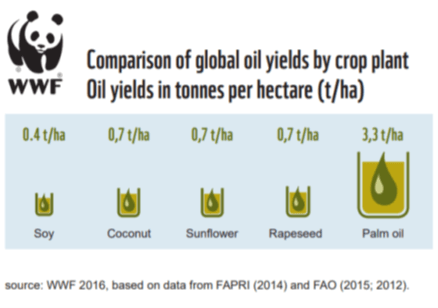It’s really important to us that we interrogate every decision we make, including the ingredients we use.
That’s why we’re on a journey to really understand Palm Oil; what it does, what the alternatives are and how we can use it in the most responsible way.
What is Palm Oil?
Palm oil is an edible vegetable oil that comes from the fruit of the palm oil tree. Oil palm trees are native to Africa but were brought to South-East Asia just over 100 years ago as an ornamental tree crop.
Now, Indonesia and Malaysia make up over 90% of global supply but there are 42 other countries that also produce palm oil.
There are two types of oil produced from the palm fruit;
Crude Palm Oil
This comes from squeezing the fleshy fruit and is mainly used in the food industry.
Palm Kernel Oil
Which comes from crushing the stone of the palm fruit. Most of the palm derived ingredients used in the cosmetic industry are derived from Palm Kernel Oil.
“Palm oil and its derivatives can be found in thousands of products as diverse as; frozen pizza, peanut butter, soap, laundry detergent, biofuels, instant noodles, margarine, cookies & lipstick.”
Palm derived ingredients cover a wide range of applications in cosmetics. Here at Bulldog we Palm Kernel in our products to cover a wide range of applications;
-
- Cleansers
- Emulsifiers to mix the water and oil phase to create a cream texture
- Emollients (i.e. moisturisers) to give a nice skin feel
Although it does change depending on the product function, palm derivatives make up on average 11% of our product ingredients
Why do we use Palm Oil?
It’s a really fair question, with so much negative press about the ingredient, it would be understandable to think that being “Palm Oil Free” is the best way forward.
Palm trees have a higher yield per hectare than any other oilseed crop, making it the most efficient crop in the world in terms of land use. For example, the yield of palm oil is over 8 times more than the yield of soybean oil.

According to a European Union report, to increase vegetable oil production by the same amount by relying on competing oilseeds instead of oil palm will require 5-8 times larger areas of land.
Palm oil and palm kernel oil have unique properties that are very hard to substitute using other crops. In cosmetics, palm oil is mainly used for the manufacture of solid bar soap. Most of the other palm derived materials used in cosmetics are manufactured from palm kernel oil and can go through up to 10 different manufacturing steps. That means it’s not a case of simply swapping out one ingredient for another.
In addition to having negative consequences for the environment, moving to a different ingredient will have a knock-on effect on the livelihood of people in areas where palm is cultivated.
We believe that supporting sustainable and socially responsible palm cultivation is currently the best answer to this challenging and nuanced issue.
What is RSPO?
The Roundtable on Sustainable Palm Oil (RSPO) was created in 2004 to promote the production and use of sustainable palm oil. RSPO represents the largest independent third-party standard for a more sustainable production of palm oil.
It’s a membership-based organisation where producers and users of palm oil and palm derivatives have to be certified and independently audited by RSPO. For palm growers, the certification is based on the adherence to RSPO’s 8 principles & criteria focusing on People, Planet and Prosperity.
RSPO also certifies the supply chains of palm oil and derivatives after they have been grown to ensure the integrity of the sustainable palm oil trade.
Our RSPO Journey
At Bulldog, we have been working hard to transition to only using palm derived materials that support the sustainable production of palm oil and become a Supply Chain Associate Member of RSPO.
In order for us to manufacture products according to the RSPO guidelines’, our manufacturers also have to be independently audited by RSPO. In order to achieve this, we have been working closely with our manufacturing partners, requiring that they become members of RSPO.
As the demand and support for sustainable palm oil derivatives grows, we hope to see more sustainable palm production and adherence to the RSPO principles.
Here at Bulldog, we will actively continue to work and continuously improve the supply chains within our control to increasingly support the sustainable palm production.
“As of February 2020, only 19% of global palm oil is certified by RSPO”
We Work Hard to Minimise Our Paw Print
So whether it’s around our packaging (like our sugarcane tubes), reducing our carbon footprint (hello CarbonNeutral®), being at the forefront of positive industry change (China Cruelty Free Pilot Project), or ensuring that we source sustainable ingredients, It’s all part of our commitment to reducing plastic and work towards a better informed and more sustainable future.














